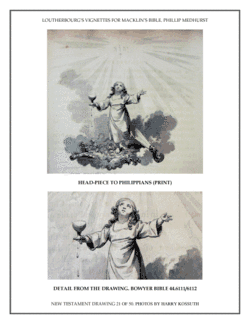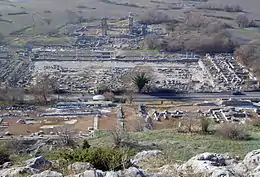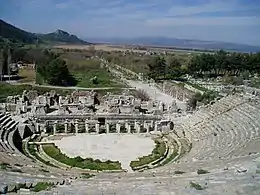Philippians 1
Philippians 1 is the first chapter of the Epistle to the Philippians in the New Testament of the Christian Bible. It is authored by Paul the Apostle about mid-50s to early 60s AD and addressed to the Christians in Philippi, written either in Rome or Ephesus.[1] This chapter contains the greeting, thanksgiving, prayer and exhortation as an introduction (overture) to the major narratives in the next chapters.[2]
| Philippians 1 | |
|---|---|
 Head-piece to Philippians. Philippians 2:7-8. Print made by James Heath. 1800. Published by T. Macklin, London. | |
| Book | Epistle to the Philippians |
| Category | Pauline epistles |
| Christian Bible part | New Testament |
| Order in the Christian part | 11 |



Text
The original text was written in Koine Greek. This chapter is divided into 30 verses.
Textual witnesses
Some early manuscripts containing the text of this chapter are:
- Codex Vaticanus (AD 325-350)
- Codex Sinaiticus (330-360)
- Codex Alexandrinus (400-440)
- Codex Ephraemi Rescriptus (c. 450; extant verses 23-30)
- Codex Freerianus (c. 450; extant verses 1-4, 11-13, 20-23)
- Codex Claromontanus (c. 550)
Greeting 1:1–2
The epistle opens using a formula found in other Paul's epistles, here with the introduction of himself and Timothy as Christ's "slaves" ("bondservants") as in Romans 1:1.[3]
Verse 1
- Paul and Timothy, bondservants of Jesus Christ,
- To all the saints in Christ Jesus who are in Philippi, with the bishops and deacons:[4]
Verse 2
- Grace to you and peace from God our Father and the Lord Jesus Christ.[7]
The wording is identical to Ephesians 1:2.[8]
Thanksgiving and Prayer 1:3–11
This is a common feature in Paul's epistles.[6] Except in Galatians, Paul thanks or blesses God for the good things he has heard about a particular church in the beginning of his letters.[9] In this epistle, Paul mixes it with his prayer for the church (1:3–4) and with joy (1:5), "a combination he will recommend in 4:6".[9] Lutheran pietist Johann Albrecht Bengel says that the whole letter can this be summarised: "The sum of the epistle is, I rejoice, rejoice ye".[10] Similarly Paul writes to the Thessalonians: Rejoice always; pray without ceasing.[11]
Paul's Situation in Chains 1:12–26
This section deals with Paul's condition during the confinement in a Roman administrative center, where he could still preach the gospel.[6] It consists of two subsections with distinctive keywords: the first subsection (verses 12–18) was marked off with two words, "progress" (prokope; verse 12) and "confidence" (verse 14), and the second one (verses 19–26) has the inclusio markers "joy", "progress" and "trusting".[12]
Verse 18
- What then? Only that in every way, whether in pretense or in truth, Christ is preached; and in this I rejoice, yes, and will rejoice.[13]
- "Is preached": the Greek (present) tense is best represented in modern English by "is being proclaimed".[8]
Verse 21
- For to me, to live is Christ, and to die is gain.[14]
- "To live is Christ": Christ becomes "efficiently" a believer's life, as the efficient cause and author of his spiritual life.[15]
- "To die is gain": It is not easy to say what a believer may gain by dying, but as soon as one dies one enters into the presence of God, where fullness of joy is, and immediately with Christ, which is far better than being here. This is the common interpretation, and is shown by the Syriac, Arabic, and Ethiopian versions, which read, "to die", or "if I die, it is gain to me".[15]
Steadfastness in the face of opposition - 1:27–30
Paul states his wish that the Philippians have "steadfast unity in fidelity to the gospel" (verse 27) and "bold resistance to their opponents" (verse 28).[16]
See also
- Bishop
- Deacon
- Jesus Christ
- Paul the Apostle
- Philippi
- Saint Timothy
- Related Bible parts: Matthew 5, John 15, John 17, Romans 8, 2 Corinthians 13, Galatians 5, Acts 16
References
- Murray 2007, pp. 1179–1180.
- Murray 2007, pp. 1180–1183.
- Murray 2007, p. 1179.
- Philippians 1:1 NKJV
- "Overseers" in the New International Version and Darby Translation; "helpers" in the Good News Translation
- Coogan 2007, p. 329 New Testament.
- Philippians 1:2 NKJV
- Moule, H. C. G., Cambridge Bible for Schools and Colleges. Philippians 1. Accessed 28 April 2019
- Murray 2007, p. 1181.
- Bengel, J. A., Bengel's Gnomon of the New Testament on Philippians 1, accessed 8 June 2020
- 1 Thessalonians 5:16–18
- Murray 2007, p. 1182.
- Philippians 1:18 NKJV
- Philippians 1:21 NKJV
- John Gill's Exposition of the Entire Bible, - Philippians 1:21
- Murray 2007, p. 1183.
Bibliography
- Coogan, Michael David (2007). Coogan, Michael David; Brettler, Marc Zvi; Newsom, Carol Ann; Perkins, Pheme (eds.). The New Oxford Annotated Bible with the Apocryphal/Deuterocanonical Books: New Revised Standard Version, Issue 48 (Augmented 3rd ed.). Oxford University Press. ISBN 9780195288810.
- Murray, SJ, Robert (2007). "69. Philippians". In Barton, John; Muddiman, John (eds.). The Oxford Bible Commentary (first (paperback) ed.). Oxford University Press. pp. 1179–1190. ISBN 978-0199277186. Retrieved February 6, 2019.
External links
- Philippians 1 King James Bible - Wikisource
- English Translation with Parallel Latin Vulgate
- Online Bible at GospelHall.org (ESV, KJV, Darby, American Standard Version, Bible in Basic English)
- Multiple bible versions at Bible Gateway (NKJV, NIV, NRSV etc.)
